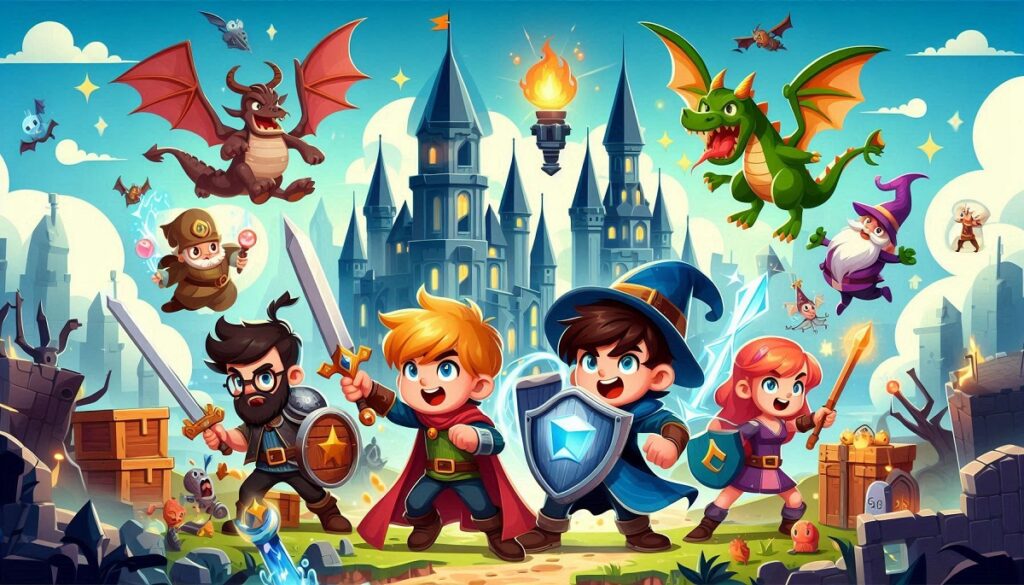
Introduction
- Definition of “Game is Game”
- Relevance and Importance of the Concept
- Historical Background and Origin
Types and Categories
Categories of Games
- Video Games
- Board Games
- Sports
- Card Games
- Role-Playing Games
Different Genres within Each Category
- Action, Adventure, Puzzle, etc.
Symptoms and Signs
- Indicators of Gaming Addiction
- Positive Signs of Gaming Engagement
- Behavioral Changes in Gamers
Causes and Risk Factors
- Biological Factors
- Environmental Influences
- Lifestyle Choices
- Technological Advances
Diagnosis and Tests
- Tools for Diagnosing Gaming Addiction
- Psychological Assessments
- Behavioral Observations
Treatment Options
- Medical Treatments
- Psychological Therapies
- Lifestyle Adjustments
- Support Groups and Communities
Preventive Measures
- Setting Healthy Boundaries
- Promoting Balanced Lifestyles
- Encouraging Social Interactions
Personal Stories or Case Studies
- Real-Life Stories of Overcoming Gaming Addiction
- Success Stories of Professional Gamers
Expert Insights
- Quotes from Psychologists
- Advice from Professional Gamers
- Insights from Game Developers
Introduction
Definition of “Game is Game”
The phrase “Game is Game” encapsulates the notion that gaming, in its myriad forms, is a legitimate and significant activity. It implies that games, whether they are video games, board games, sports, or any other type, hold intrinsic value and should be recognized for their complexity, cultural importance, and impact on individuals and society.
Relevance and Importance of the Concept
In today’s digital age, gaming has become a ubiquitous part of our lives. The relevance of understanding “Game is Game” lies in acknowledging the diverse ways games influence our cognitive, social, and emotional well-being. Recognizing the importance of games helps in appreciating their role in education, entertainment, and even professional realms.
Historical Background and Origin
The concept of games dates back to ancient civilizations, where they were used for both educational purposes and leisure. From the ancient Egyptian game of Senet to modern-day video games, the evolution of gaming reflects the advancement of human culture and technology. Understanding this history enriches our appreciation of contemporary gaming practices.
Types and Categories
Categories of Games
Video Games
Video games are electronic games that involve interaction with a user interface to generate visual feedback. They range from simple games like Tetris to complex multiplayer online games like World of Warcraft.
Board Games
Board games are tabletop games that involve counters or pieces moved or placed on a pre-marked surface according to a set of rules. Examples include classics like Chess and modern games like Settlers of Catan.
Sports
Sports are physical games that involve skill and physical exertion. They range from team sports like football to individual sports like tennis.
Card Games
Card games are games played with a deck of cards. They include a variety of games like Poker, Solitaire, and Bridge.
Role-Playing Games
Role-playing games (RPGs) involve players assuming the roles of characters in a fictional setting. Players act out these roles within a narrative, either through literal acting or through structured decision-making regarding character development.
Different Genres within Each Category
Action, Adventure, Puzzle, etc.
Each category of games can be further divided into genres. For instance, video games include action games, adventure games, puzzle games, and more. Board games can be strategic, cooperative, or competitive. Understanding these genres helps in appreciating the diversity within the gaming world.
Symptoms and Signs
Indicators of Gaming Addiction
Gaming addiction is characterized by an inability to control the amount of time spent on gaming, leading to negative consequences in daily life. Symptoms include neglecting personal responsibilities, withdrawal symptoms when not gaming, and continued gaming despite negative impacts.
Positive Signs of Gaming Engagement
Not all gaming is harmful. Positive signs of healthy gaming engagement include improved cognitive skills, enhanced problem-solving abilities, and the development of social connections through multiplayer games.
Behavioral Changes in Gamers
Gamers might exhibit behavioral changes such as increased competitiveness, improved hand-eye coordination, and a better ability to handle complex tasks. These changes can be both positive and negative, depending on the context and extent of gaming.
Causes and Risk Factors
Biological Factors
Genetic predispositions and neurobiological factors can contribute to gaming addiction. Dopamine release in the brain during gaming can create a cycle of pleasure and reward, making it difficult for some individuals to disengage.
Environmental Influences
Environmental factors such as availability of games, peer pressure, and social acceptance play significant roles in gaming habits. Easy access to gaming devices and platforms can increase the likelihood of gaming addiction.
Lifestyle Choices
Lifestyle choices, including the amount of free time and recreational activities available, influence gaming behavior. Individuals with limited social interactions or other hobbies might turn to gaming as their primary source of entertainment.
Technological Advances
Advancements in technology have made games more immersive and engaging. High-definition graphics, virtual reality, and sophisticated game mechanics can make games more addictive.
Diagnosis and Tests
Tools for Diagnosing Gaming Addiction
Diagnostic tools like the Internet Gaming Disorder Scale (IGDS) and the Gaming Addiction Scale (GAS) are used to identify gaming addiction. These tools assess various aspects of gaming behavior and its impact on daily life.
Psychological Assessments
Psychological assessments conducted by professionals help in diagnosing gaming addiction. These assessments evaluate the psychological state of the individual, looking for signs of dependency and withdrawal.
Behavioral Observations
Behavioral observations involve monitoring the gaming habits of individuals and identifying patterns that indicate addiction. These observations can be conducted by psychologists, family members, or the individuals themselves.
Treatment Options
Medical Treatments
Medical treatments for gaming addiction include medication to manage underlying mental health conditions such as anxiety and depression, which often co-occur with gaming addiction.
Psychological Therapies
Cognitive-behavioral therapy (CBT) and other psychological therapies are effective in treating gaming addiction. These therapies help individuals develop healthier gaming habits and address underlying psychological issues.
Lifestyle Adjustments
Encouraging balanced lifestyles with a mix of physical activity, social interaction, and recreational activities can help manage gaming addiction. Setting limits on gaming time and promoting other hobbies are crucial steps.
Support Groups and Communities
Support groups and communities provide a platform for individuals to share their experiences and seek support. Groups like Gamers Anonymous offer resources and support for those struggling with gaming addiction.
Preventive Measures
Setting Healthy Boundaries
Establishing and adhering to healthy boundaries around gaming time helps prevent addiction. Parents and individuals can set limits on gaming hours and ensure a balance with other activities.
Promoting Balanced Lifestyles
Promoting a balanced lifestyle that includes physical activities, social interactions, and other hobbies can prevent gaming from becoming an addiction.
Encouraging Social Interactions
Encouraging social interactions outside of gaming helps individuals build real-world connections and reduces the likelihood of gaming becoming their primary social outlet.
Personal Stories or Case Studies
Real-Life Stories of Overcoming Gaming Addiction
Real-life stories of individuals who have overcome gaming addiction provide hope and inspiration. These stories highlight the challenges and triumphs of regaining control over gaming habits.
Success Stories of Professional Gamers
Professional gamers who have successfully balanced their gaming careers with healthy lifestyles serve as role models. Their stories demonstrate that it is possible to enjoy gaming without it taking over one’s life.
Expert Insights
Quotes from Psychologists
Psychologists provide valuable insights into the effects of gaming on mental health. Quotes from experts help in understanding the psychological aspects of gaming.
Advice from Professional Gamers
Professional gamers share tips on maintaining a healthy balance between gaming and other life activities. Their advice is based on personal experiences and professional insights.
Insights from Game Developers
Game developers provide a unique perspective on the design and impact of games. Their insights help in understanding the intentions behind game mechanics and their potential effects on players.

